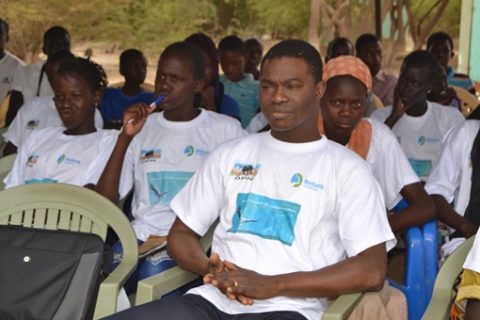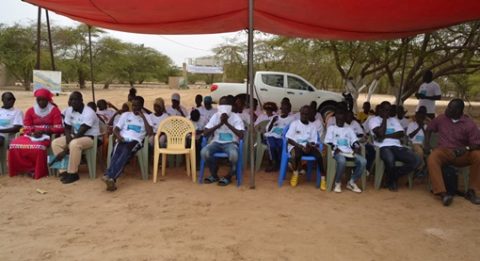“Energy – make it bird-friendly!” was the theme of the 09th and 10th May 2015 celebrated World Migratory Bird Day in Senegal. The event was an opportunity to strengthen human sensitivity to the need to protect birds and also involve them in this annual awareness-raising campaign highlighting the need for the protection of migratory birds and their habitats. Migratory Birds are facing threats related to human activities notably the need to meet the pressing energy demands, hence seriously assaulting wetlands on which migratory birds depend. This year in Senegal, the National Park of Langue de Barbarie played host to the event in partnership with Wetlands International, the management of the park and primary schools in Gandiole together with University Gaston Berger of the Senegalese region of Saint-Louis.
 The National Park of Langue de Barbarie and the young audience of elementary school students in the area, were not randomly targeted during celebrations of these international days dedicated to migratory birds. Wetlands International remains convinced that it is through a joint collaboration with partners and the populations living in threatened wetland areas that awareness will lead to conservation measures for migratory birds. Therefore, the best audience is the children who, in a few years will pilot the development of their countries in a transition to more environmentally friendly methods to protect life on Earth.
The National Park of Langue de Barbarie and the young audience of elementary school students in the area, were not randomly targeted during celebrations of these international days dedicated to migratory birds. Wetlands International remains convinced that it is through a joint collaboration with partners and the populations living in threatened wetland areas that awareness will lead to conservation measures for migratory birds. Therefore, the best audience is the children who, in a few years will pilot the development of their countries in a transition to more environmentally friendly methods to protect life on Earth.
Addressing the students who are considered to be future engineers and policy makers, as well as speaking to teachers and the traditional leaders attending the event, commander Moussa Fall, manager of the National Park of Langue de Barbarie, recalled the dangers that men often cause to migratory birds. “It is urgent to implement measures to minimize the threats on migratory birds caused by the development of new technologies for renewable energies such as solar, wind, geothermal, etc. The towers, power lines, solar parks etc., are very useful but often lethal to migratory birds and their habitat. These infrastructure must therefore respect a number of rules in their design, installation and evolution to spare the survival of birds” said the commander Fall. He also spoke about the opportunities and existing threats in his park before inviting the people of Gandiolais to invest more in the actions of protection and conservation of species living in the park.
 For his part, Mr. Gabin Agblonon, Project manager at Wetlands International Africa, recalled that as a technical arm of certain international conventions, such as Ramsar, AEWA, Wetlands International works and contributes actively to the development and adoption of good practices to make all energy facilities, new and existing ones, less harmful to migratory birds. “Wetlands International is working with local partners to achieve more awareness in favor of conservation actions for migratory birds. This is for example the case in the area of the Senegal River Delta where, in addition to the conservation plan that is being finalized, the organization conducts action plans for habitat restoration in important sites in Senegal and Mauritania as part of the project “From the Arctic to Africa,” Mr Agblonon said.
For his part, Mr. Gabin Agblonon, Project manager at Wetlands International Africa, recalled that as a technical arm of certain international conventions, such as Ramsar, AEWA, Wetlands International works and contributes actively to the development and adoption of good practices to make all energy facilities, new and existing ones, less harmful to migratory birds. “Wetlands International is working with local partners to achieve more awareness in favor of conservation actions for migratory birds. This is for example the case in the area of the Senegal River Delta where, in addition to the conservation plan that is being finalized, the organization conducts action plans for habitat restoration in important sites in Senegal and Mauritania as part of the project “From the Arctic to Africa,” Mr Agblonon said.
In addition, Gabin Agblonon stressed that Wetlands International is proud to support this campaign as a strategic partner. “We hope that children, teachers, parents and the community will help to protect and restore wetlands that play a crucial role in safeguarding these impressive annual migrations made by these fantastic species are migratory birds. They can be the catalyst for socio-economic activities that are very helpful to people and the fight against poverty as is the case in the Djoudj national Park” he insisted.
Students from University Gaston Berger of Saint Louis, a representative of the management of the National parks and wildlife in Senegal, the Imam and village leaders were all present at the ceremony marking the celebration of the World migratory bird days’ in the north of Senegal.